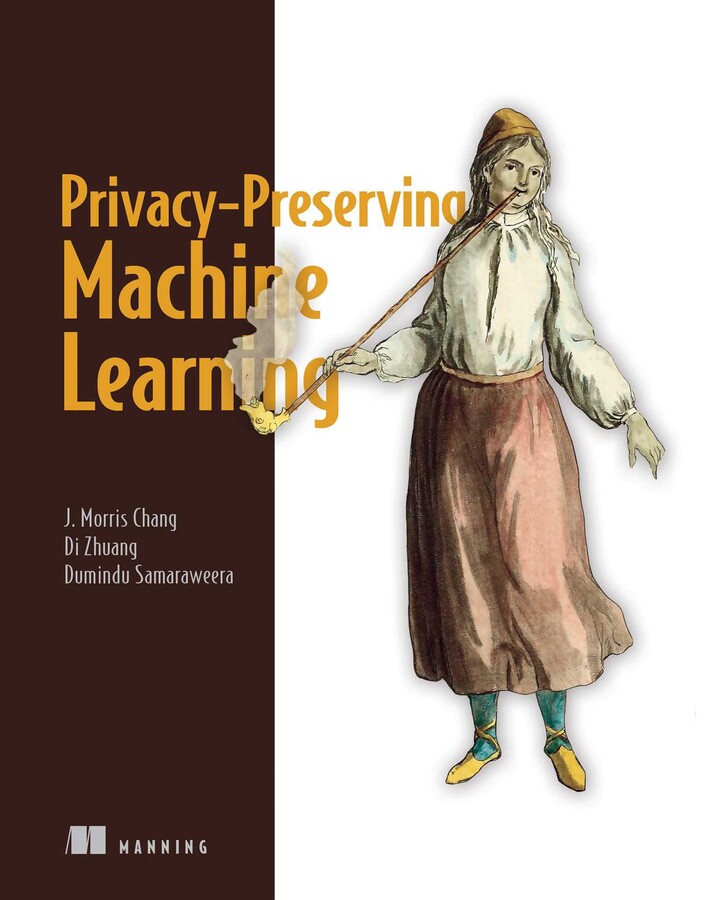Plus, receive recommendations and exclusive offers on all of your favorite books and authors from Simon & Schuster.
Privacy-Preserving Machine Learning
Published by Manning
Distributed by Simon & Schuster
LIST PRICE $59.99
PRICE MAY VARY BY RETAILER
Free shipping when you spend $40. Terms apply.
Buy from Other Retailers
Table of Contents
About The Book
In Privacy Preserving Machine Learning, you will learn:
- Privacy considerations in machine learning
- Differential privacy techniques for machine learning
- Privacy-preserving synthetic data generation
- Privacy-enhancing technologies for data mining and database applications
- Compressive privacy for machine learning
Privacy-Preserving Machine Learning is a comprehensive guide to avoiding data breaches in your machine learning projects. You’ll get to grips with modern privacy-enhancing techniques such as differential privacy, compressive privacy, and synthetic data generation. Based on years of DARPA-funded cybersecurity research, ML engineers of all skill levels will benefit from incorporating these privacy-preserving practices into their model development. By the time you’re done reading, you’ll be able to create machine learning systems that preserve user privacy without sacrificing data quality and model performance.
Purchase of the print book includes a free eBook in PDF, Kindle, and ePub formats from Manning Publications.
About the Technology
Machine learning applications need massive amounts of data. It’s up to you to keep the sensitive information in those data sets private and secure. Privacy preservation happens at every point in the ML process, from data collection and ingestion to model development and deployment. This practical book teaches you the skills you’ll need to secure your data pipelines end to end.
About the Book
Privacy-Preserving Machine Learning explores privacy preservation techniques through real-world use cases in facial recognition, cloud data storage, and more. You’ll learn about practical implementations you can deploy now, future privacy challenges, and how to adapt existing technologies to your needs. Your new skills build towards a complete security data platform project you’ll develop in the final chapter.
What’s Inside
- Differential and compressive privacy techniques
- Privacy for frequency or mean estimation, naive Bayes classifier, and deep learning
- Privacy-preserving synthetic data generation
- Enhanced privacy for data mining and database applications
About the Reader
For machine learning engineers and developers. Examples in Python and Java.
About the Author
J. Morris Chang is a professor at the University of South Florida. His research projects have been funded by DARPA and the DoD. Di Zhuang is a security engineer at Snap Inc. Dumindu Samaraweera is an assistant research professor at the University of South Florida. The technical editor for this book, Wilko Henecka, is a senior software engineer at Ambiata where he builds privacy-preserving software.
Table of Contents
PART 1 - BASICS OF PRIVACY-PRESERVING MACHINE LEARNING WITH DIFFERENTIAL PRIVACY
1 Privacy considerations in machine learning
2 Differential privacy for machine learning
3 Advanced concepts of differential privacy for machine learning
PART 2 - LOCAL DIFFERENTIAL PRIVACY AND SYNTHETIC DATA GENERATION
4 Local differential privacy for machine learning
5 Advanced LDP mechanisms for machine learning
6 Privacy-preserving synthetic data generation
PART 3 - BUILDING PRIVACY-ASSURED MACHINE LEARNING APPLICATIONS
7 Privacy-preserving data mining techniques
8 Privacy-preserving data management and operations
9 Compressive privacy for machine learning
10 Putting it all together: Designing a privacy-enhanced platform (DataHub)
Product Details
- Publisher: Manning (May 2, 2023)
- Length: 336 pages
- ISBN13: 9781617298042
Browse Related Books
Resources and Downloads
High Resolution Images
- Book Cover Image (jpg): Privacy-Preserving Machine Learning Trade Paperback 9781617298042











